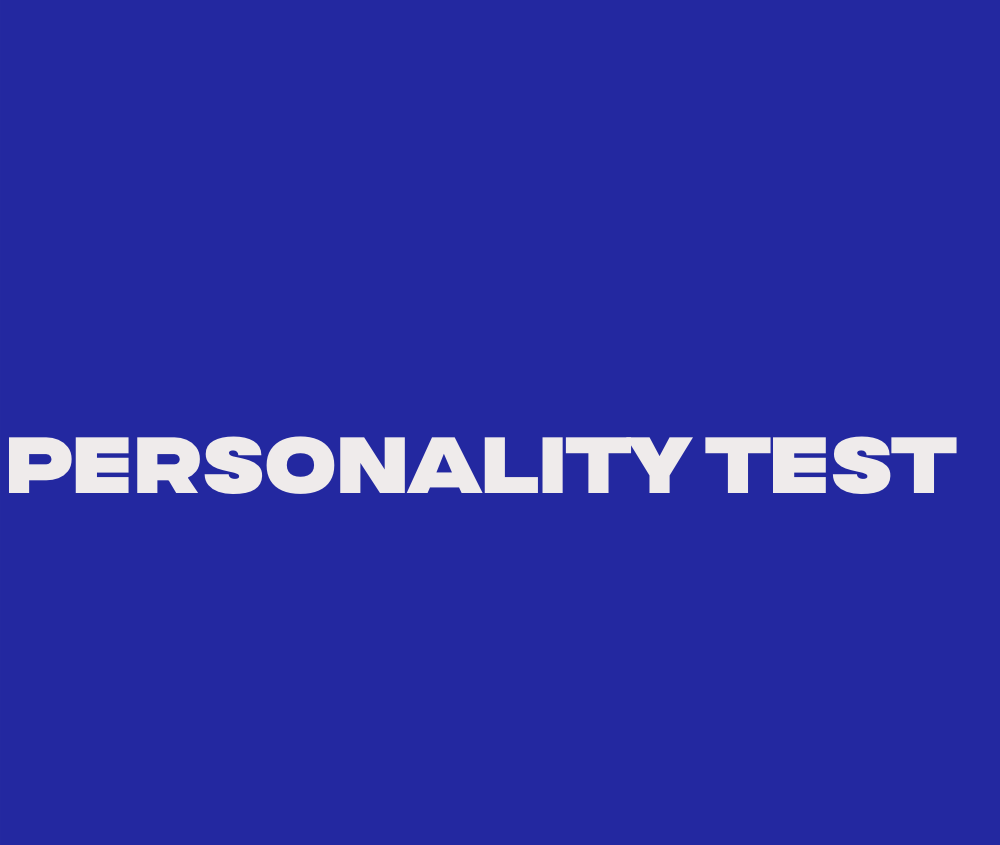Personality Exploration
آزمون شخصیت شناسی شانزده گانه

Have you ever thought about the fact that every person needs the best communication and understanding? Statistics show that there are more than 7 billion people in the world and each person has a unique personality. In this largest population in history, do we need a tool for better self-awareness and understanding of ourselves and others?
آزمون شخصیت شناسی شانزده گانه، یک آزمون روانسنجی است که براساس مدل MBTI و نظریهی یونگ طراحی شده است. این آزمون به ما کمک میکند تا شخصیت و نقاط قوت خود را بهتر بشناسیم و بهترین روشها برای موفقیت در زندگی شغلی و پیشرفت در روابط را درک کنیم. با شرکت در آزمون، افراد به یکی از شانزده نوع شخصیتی تعلق میگیرند که ویژگیها و ترجیحات منحصر به فردی دارد.
آیا شما هم علاقهمندید که بیشتر درباره آزمون شخصیت شناسی شانزده گانه بدانید؟ ادامه مطلب را بخوانید و بیشتر درباره اهمیت آن، تاریخچه، نوعهای شخصیتی و کاربردهایش بدانید.
نکات کلیدی:
- آزمون شخصیت شناسی شانزده گانه بر پایه مدل MBTI و نظریه یونگ طراحی شده است.
- شرکت در این آزمون به ما کمک میکند تا شخصیت و نقاط قوت خود را بشناسیم.
- افراد به یکی از شانزده نوع شخصیتی تعلق میگیرند و ویژگیهای منحصر به فردی دارند.
- آزمون شخصیت شناسی شانزده گانه در زندگی شخصی و شغلی اهمیت بسیاری دارد.
- کاربردهای آزمون شامل استخدام، تیمبندی، رشد شخصی و بهبود مهارتهای ارتباطی است.
تاریخچه آزمون شخصیت شناسی شانزده گانه
آزمون شخصیت شناسی شانزده گانه توسط ایزابل مایرز و کاترین بریگز بر اساس تئوری کارل یونگ در دهه ۱۹۴۰ ایجاد شد. این آزمون بر مبنای ترجیحات شخصیتی فرد، ویژگیها، واکنشها و ترجیحات شغلی و روابط طراحی شده است. مایرز و بریگز به منظور کمک به افراد در انتخاب شغل و زندگی بهتر، این آزمون را طراحی کردند. این آزمون یکی از معتبرترین و پرکاربردترین آزمونهای شخصیت شناسی در دنیا است و توسط محققان، مشاوران و سازمانها به عنوان ابزاری مفید برای شناسایی نوع شخصیت و تقویت روابط استفاده میشود.
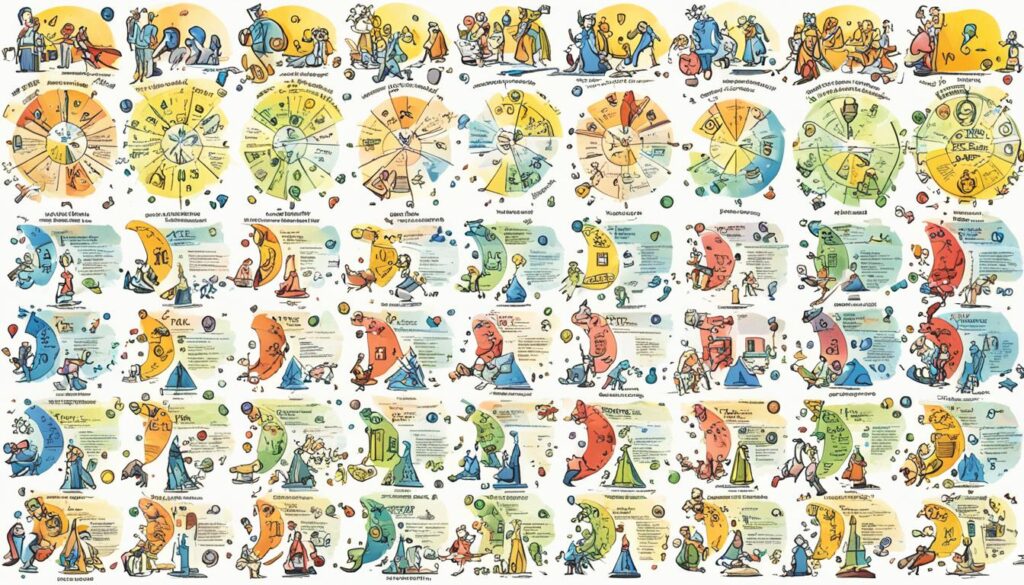
| تاریخچه | آزمون شخصیت شناسی شانزده گانه |
|---|---|
| تئوری مبتنی بر | کارل یونگ |
| طراحان | ایزابل مایرز و کاترین بریگز |
| اهمیت | کمک به افراد در انتخاب شغل و زندگی بهتر |
| ویژگیها | ترجیحات شخصیتی، ویژگیها، واکنشها و ترجیحات شغلی و روابط |
استفاده از آزمون شخصیت شناسی شانزده گانه میتواند در شناسایی نوع شخصیتی و بهبود روابط شخصی و حرفهای کمک کند و به توسعه فردی و رشد سازمانی کمک کند.
اهمیت آزمون شخصیت شناسی شانزده گانه
آزمون شخصیت شناسی شانزده گانه اهمیت بسیاری در شناخت بهتر از خود و دیگران دارد. با شناخت نوع شخصیت خود، میتوانید بهترین راهها برای ارتباطات، کارآمدی، خلاقیت و تعامل با دیگران را پیدا کنید.
در محیط کاری، آشنایی با شخصیت همکاران و رؤیای کاری آنها میتواند به بهبود همکاری و ارتباطات در سازمان کمک کند. این آزمون میتواند به عنوان یک ابزار ارزشمند در استخدام، توسعه فردی و رشد سازمانی استفاده شود.

شناخت خود و دیگران
آزمون شخصیت شناسی شانزده گانه به شما این امکان را میدهد که با صحیحترین شکل ممکن از خود و دیگران آگاه شوید. با شناخت نوع شخصیتی خود و مشاهده واکنشها، علاقهمندیها و ترجیحات شخصیتی خود میتوانید به بهبود روابط شخصی و حرفهای خود بپردازید و رشد کنید.
ارتباطات و کارآمدی
شناخت شخصیت خود و دیگران میتواند به شما در ارتباطات خود و با دیگران کمک کند. با شناخت ترجیحات و نحوهی اندیشیدن و عملکرد دیگران، میتوانید بهترین روشها برای برقراری ارتباط موثر و کارآمد با آنها را پیدا کنید.
خلاقیت و تعامل
شناخت نوع شخصیتی خود میتواند به شما در بهبود خلاقیت و تعامل با دیگران کمک کند. با شناخت نقاط قوت و ضعف خود، میتوانید در فعالیتهای خلاقانه بیشتر به خود اعتماد کنید و در تعاملات روزمره با دیگران موفقیت بیشتری داشته باشید.
نوعهای شخصیتی در آزمون شخصیت شناسی شانزده گانه
آزمون شخصیت شناسی شانزده گانه به افراد کمک میکند تا به یکی از شانزده نوع شخصیتی تعلق پیدا کنند. این نوعهای شخصیتی شامل INFJ، INTJ، ENFP، ENTP، INFP، ISFP، ENFJ، ESFJ، INTP، ISTP، ENTJ، ESTJ، ISFJ، ISTJ، ESFP، و ESTP میشوند. هر نوع شخصیتی ویژگیها، سبکهای تفکر و عملکرد، علاقهمندیها و روش کاری منحصر به فردی دارد.
نوع شخصیتی ویژگیها سبکهای تفکر و عملکرد علاقهمندیها روش کاری INFJ تاملگر، خلاق و باطنی تفکر عمیق، برنامهریزی، تأمل بهبود جهان، کمک به دیگران، خلاقیت سازماندهی، برنامهریزی، همکاری INTJ مستقل، منطقی و بینشی تحلیل دقیق، برنامهریزی استراتژیک، نظم و انضباط حل مسئله، تحلیل، آفرینش تحقیق، شناسایی الگوها، ساختاردهی ENFP همدرد، خلاق و پرانرژی اندیشه پراکنده، ارتباطات بهتر و خلاقیت کشف جهان، کمک به دیگران، خلاقیت نوآوری، شناسایی فرصتها، نقشهبرداری ENTP خلاق، مبادلهگر و پرانرژی تحلیل پویا، ایدهپردازی، چالش پذیری کشف جهان، آزادی عمل، حل مسئله حل مسئله، آزمایش فرضیهها، ارتباطات
هر یک از این نوعهای شخصیتی تعدادی ویژگی مشخص دارد و به روشهای خاصی در فكركرد، برخورداری، علاقهمندیها و روشهای کاری دست مییابند. شناخت نوع شخصیتی خود و دیگران میتواند در تفاهم بهتر، ارتباطات موثرتر و رشد فردی و حرفهای کمک شایانی کند.
چگونگی انجام آزمون شخصیت شناسی شانزده گانه
برای انجام آزمون شخصیت شناسی شانزده گانه، شما باید سوالاتی را پاسخ دهید که بر اساس ترجیحات شما و واکنشهایی که در موقعیتهای مختلف دارید، طراحی شدهاند. این آزمون معمولاً در حدود ۱۵ دقیقه طول میکشد و میتوانید به صورت آنلاین آن را انجام دهید. نتیجه آزمون به شما نوع شخصیتی خود و ویژگیها و ترجیحات تان را نشان میدهد.

آزمون شخصیت شناسی شانزده گانه با سوالاتی که از شما پرسیده میشود، تمام جنبههای شخصیتی شما را بررسی میکند. به ازای هر سوال، شما باید بر اساس واکنشها و ترجیحات خود پاسخ دهید. پاسخهای شما به این سوالات نشان میدهد که در موقعیتهای مختلف چگونه با رفتارها و ترجیحات واکنش میدهید.
دستههای مختلف سوالات در آزمون شخصیت شناسی شانزده گانه وجود دارد که هر کدام به ترجیحات شما در زمینههای مختلف مانند شغل، روابط، ارتباطات و سبکهای تفکر مرتبط است. با تجمیع پاسخهای شما، آزمون نوع شخصیتی و مشخصههای خاصی را برای شما تعیین میکند.
برای انجام آزمون میتوانید از منابع آنلاین استفاده کنید. آزمون شخصیت شناسی شانزده گانه به طور گسترده از طرفان مختلف استفاده میشود، بنابراین منابع معتبر آن بسیار موجود هستند. پس از اتمام آزمون، شما به نتیجه خود دست خواهید یافت و اطلاعاتی درباره شخصیت خود به دست خواهید آورد که میتوانید آنها را در زندگی شخصی و شغلی خود استفاده کنید.
کاربردهای آزمون شخصیت شناسی شانزده گانه
آزمون شخصیت شناسی شانزده گانه قابل استفاده در مختلف زمینهها و کاربردها است. این آزمون میتواند در انتخاب شغل و استخدام مفید باشد. با شناخت نوع شخصیت خود و ترجیحات شغلیتان، میتوانید بهترین شغل و محیط کاری برای خود را پیدا کنید. همچنین، آزمون شخصیت شناسی شانزده گانه به شما کمک میکند تا مهارتهای تیمی و همکاری را در محیط کاری بهبود بخشید. این آزمون همچنین امکان رشد شخصی و توسعه فردی را فراهم میکند، زیرا با شناخت بهتر از خود، میتوانید به موفقیتهای بیشتری دست یابید.
در ضمن، آزمون شخصیت شناسی شانزده گانه میتواند به شما بهترین راههای ارتباطی و مدیریت روابط را نشان دهد. با شناخت نوع شخصیت و شناخت مهارتهای ارتباطی خود، میتوانید بهترین روشها برای برقراری ارتباط با دیگران و بهبود روابط فردیتان را پیدا کنید. همچنین، آزمون شخصیت شناسی شانزده گانه میتواند به بهبود مهارتهای رهبری کمک کند. با شناخت و درک بهتر از شخصیت خود، میتوانید بهترین راهها برای رهبری موثر و برنامهریزی زندگی خود را پیدا کنید.
«آزمون شخصیت شناسی شانزده گانه در انتخاب شغل، تیمبندی، توسعه فردی و مدیریت روابط بسیار کارآمد است. این آزمون میتواند به شما کمک کند تا بهترین راهها را برای رسیدن به موفقیت در زندگی شخصی و شغلیتان پیدا کنید.»
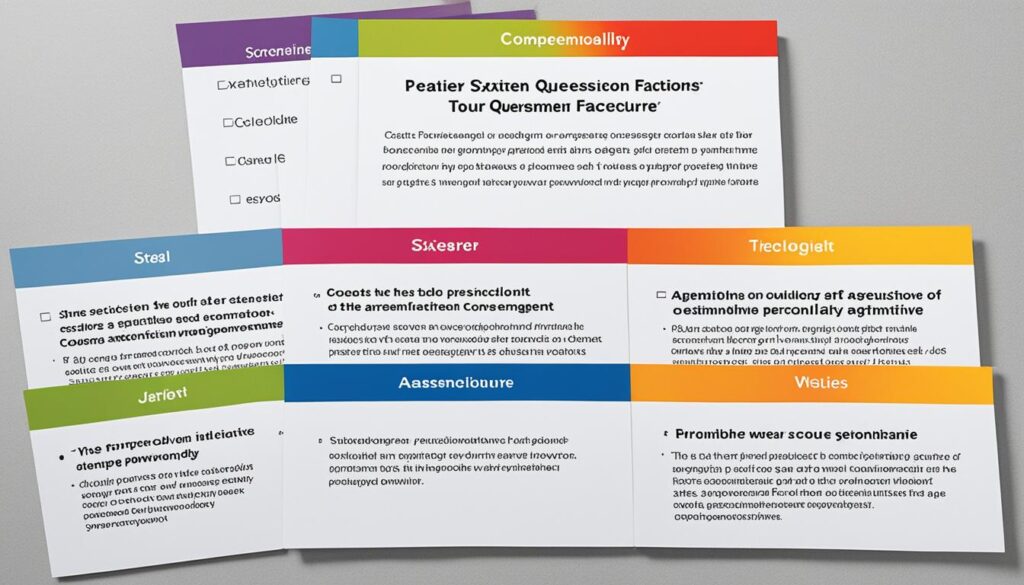
استخدام و انتخاب شغل
آزمون شخصیت شناسی شانزده گانه میتواند در مراحل استخدام و انتخاب شغل بسیار مفید باشد. با شناخت نوع شخصیت خود و ترجیحات شغلیتان، میتوانید بهترین شغل و محیط کاری برای خود را پیدا کنید. همچنین، با توجه به نوع شخصیت خود، میتوانید بر اساس ویژگیها و ترجیحاتتان، مهارتهای لازم برای شغل خود را توسعه دهید و در مسیر رشد حرفهایتان پیش بروید.
تیمبندی و همکاری در محیط کاری
آزمون شخصیت شناسی شانزده گانه قابل استفاده در تیمبندی و همکاری در محیط کاری است. با شناخت نوع شخصیت و شخصیتهای همکارانتان، میتوانید بهترین روشها را برای همکاری و ارتباط با افراد دیگر پیدا کنید. همچنین، با توجه به نوع شخصیت خود و همکاران، میتوانید مناسبترین روشها برای تشکیل گروه و تیمبندی را انتخاب کرده و همکاری موثری را در محیط کاری ایجاد کنید.
رشد شخصی و توسعه فردی
آزمون شخصیت شناسی شانزده گانه میتواند به شما در رشد شخصی و توسعه فردی کمک کند. با شناخت نوع شخصیت و ویژگیها و تمایلات خود، میتوانید بهترین راهها را برای توسعه شخصی و بهبود مهارتها و قابلیتهایتان پیدا کنید. همچنین، با شناخت نقاط قوت و ضعف خود میتوانید به پیشرفت و بهبود کیفیت زندگی شخصیتان دست یابید.
بهترین روشهای ارتباط و مدیریت روابط
با شناخت نوع شخصیت خود و نوع شخصیت دیگران، میتوانید بهترین روشها برای برقراری ارتباط با دیگران و مدیریت روابط را پیدا کنید. با توجه به ویژگیها و ترجیحات شخصیتی خود و دیگران، میتوانید روشهای مؤثری برای ارتباط مؤثر، حل مشکلات و مدیریت روابط فردیتان را بیابید. همچنین، با شناخت بهتر از خود و دیگران، میتوانید در مسیر رسیدن به اهداف شخصی و حرفهای خود به بهترین روش ممکن پیش بروید.
تعامل با دیگران
آزمون شخصیت شناسی شانزده گانه به شما کمک میکند تا بهترین راهها را برای تعامل با دیگران پیدا کنید. با شناخت نوع شخصیت خود و تفاوتهای شخصیتی با افراد دیگر، میتوانید روشهای مؤثری برای برقراری ارتباط، احترامگذاری به مرزهای شخصیتی و حفظ روابط موثر با دیگران بیابید. همچنین، با شناخت بهتر از تمایلات و نیازهای دیگران، میتوانید بهترین روشها برای کمک به آنها و تحقق هدف مشترک را پیدا کنید.
بهبود مهارتهای رهبری و برنامهریزی زندگی
آزمون شخصیت شناسی شانزده گانه میتواند به شما کمک کند تا مهارتهای رهبری و برنامهریزی زندگی خود را بهبود بخشید. با شناخت نوع شخصیت خود و ویژگیهای شخصیتی خود، میتوانید بهترین راهها را برای موفقیت در نقش رهبری و برنامهریزی زندگیتان پیدا کنید. همچنین، با توجه به نوع شخصیت و تفاوتهای شخصیتی با افراد دیگر، میتوانید روشهای مؤثری برای مدیریت زمان، تعیین اولویتها و دستیابی به اهدافتان پیدا کنید.
فواید شناخت شخصیت در زندگی شخصی و شغلی
فهم و شناخت صحیح از شخصیت خود، به شما کمک میکند تا ارتباطات بهتری برقرار کنید، روابط شخصی و حرفهای بهبود یابد، مهارتهای ارتباطی و مدیریت روابط فردیتان را بهبود بخشید و بهترین راهها برای رسیدن به موفقیت در زندگی شخصی و شغلی را پیدا کنید. شناخت خود و دیگران در سازمانها و تیمهای کاری نقش بسزایی در حل مسائل و کارآیی دارد و میتواند به رشد و پیشرفت شغلی شما کمک کند.
با شناخت شخصیت خود، میتوانید:
- بهبود ارتباطات: شناخت صحیح از شخصیت خود به شما کمک میکند تا در مواجهه با دیگران، راههای بهتری برای ارتباط برقرار کنید. با درک نیازها و تمایلات شخصیتی افراد، میتوانید بهترین روشها را برای برقراری ارتباط موثر و موفقیتآمیز با همکاران، دوستان و خانواده پیدا کنید.
- ارتقای روابط شخصی و حرفهای: با شناخت خود و دیگران، میتوانید روابط شخصی و حرفهای خود را بهبود بخشید. با درک صحیح از نیازها، ترجیحات و فرهنگ فرد دیگر، میتوانید روابط را بر اساس احترام، تعاون و فهم مشترک، به سمت رشد و تقویت هدایت کنید.
- توسعه مهارتهای ارتباطی و مدیریت روابط: با شناخت خود و دیگران، میتوانید بهبود مهارتهای ارتباطی خود را تحقق بخشید و بهترین راهها را برای مدیریت روابط با همکاران، مشتریان، و سایر افراد در زندگی شخصی و مهنی پیدا کنید. این مهارتها شامل شناخت نحوه برقراری ارتباط، مهارتهای گفتگو، گوش کردن فعال، قدرت تفکر استراتژیک و حل مسائل در روابط است.
همچنین، شناخت شخصیت خود و دیگران در زمان و منابع سازمانی نقش بسزایی دارد:
- حل مسائل و کارآیی: با شناخت شخصیت همکاران و اعضای تیم، میتوانید بهترین راه حلها را برای حل مسائل مشترک پیدا کنید و کارآیی تیم و سازمان را افزایش دهید. شناخت تیمهای متشکل از افراد با نوع شخصیتی مختلف، زمینه رشد و تعاملهای بهتری را برای تیم فراهم میکند.
- موفقیت شغلی: با شناخت مهارتها، تمایلات و ترجیحات شغلی خود و دیگران، میتوانید بهترین تصمیمها را در زمینه شغلی بگیرید و به موفقیت در زمینه حرفهای دست یابید. شناخت شخصیت، به شما کمک میکند تا شغل و مسیر شغلیای را انتخاب کنید که با تمایلات و شخصیت شما همخوانی دارد.
«شناخت شخصیتی نیاز اساسی هر فرد است. این شناخت، کلید موفقیت در زندگی شخصی و شغلی است.»
به طور خلاصه، فهم و شناخت صحیح از شخصیت خود و دیگران ابزاری بسیار قدرتمند است که میتواند به ارتقاء زندگی شخصی و شغلی شما کمک کند. با بهرهگیری از شناخت صحیح، میتوانید بهترین راهها را برای رسیدن به موفقیت در ارتباطات، مهارتهای ارتباطی، روابط شخصی و حرفهای، توسعه فردی و رشد سازمانی پیدا کنید.
چالشها در استفاده از آزمون شخصیت شناسی شانزده گانه
استفاده از آزمون شخصیت شناسی شانزده گانه همراه با چالشهایی نیز میآید. برای مثال، ممکن است فرد نتیجه آزمون را بهعنوان یک لیبل خاص در نظر بگیرد و به تنهایی برخی صفات را برای خود قائل شود. همچنین، افراد ممکن است در تفسیر اشتباه نتایج آزمون باشند و این میتواند باعث شود که نمیتوانند به شکل موثری از آزمون استفاده کنند. لازم است با دقت و آگاهی به نتایج آزمون نگاه کنیم و آنها را به عنوان مبنایی برای شناخت و توسعه فردی در نظر بگیریم.
توجه ویژه به تفسیر صحیح نتایج آزمون شخصیت شناسی شانزده گانه از اهمیت بالایی برخوردار است. انتخاب نتایج آزمون به عنوان لیبلهای محدود کننده و نقشه راه مشخصی برای شخصیت ما میتواند باشد. بنابراین، پیشنهاد میشود به جای اینکه نتایج آزمون را به تنهایی تحلیل کنیم، از راهنمایی یک متخصص بهرهبریم یا به استفاده از کتابها و منابع قابل اعتمادی مانند مقالات علمی و کتابهای از سوی متخصصان در این زمینه روی آوریم.
در تفسیر نتایج آزمون شخصیت شناسی شانزده گانه، باید به دقت به نمودارها و توصیفات صفات مربوط به هر یک از نوعهای شخصیتی توجه کنیم. همچنین، باید به عوامل محیطی و تربیتی که بر شخصیت ما تأثیر دارند، توجه کنیم تا به شیوهای سازنده و تأثیرگذار در زندگی شخصی و شغلی خود بتوانیم از نتایج آزمون استفاده کنیم.
توصیهها برای استفاده موثر از آزمون شخصیت شناسی شانزده گانه:
- آگاهی از محدودیتها: باید دقیقاً درک کنیم که آزمون شخصیت شناسی شانزده گانه تنها یکی از ابزارهای شناختی در مورد شخصیت ماست و تنها بخشی از تصویر کاملی از خودمان میتواند باشد.
- توجه به زمان: نتایج آزمون ممکن است در طول زمان تغییر کنند. بنابراین، مناسب است که آزمون را در بازههای زمانی مناسب تکرار کنیم تا تغییرات شخصیتی خود را نگران نشویم.
- استفاده درست از نتایج: نتایج آزمون باید به عنوان یک راهنما و ابزار برای توسعه شخصی و بهبود روابط استفاده شود، نه به عنوان یک حکم قطعی که محدوده رفتاری ما را مشخص میکند.
نکتههای مهم برای استفاده از آزمون شخصیت شناسی شانزده گانه:
- از تحلیل خود تنها بپرهیزید و در صورت نیاز، با متخصصان و روانشناسان مشورت کنید.
- از منابع معتبر و مورد تأیید درباره آزمون شخصیت شناسی شانزده گانه استفاده کنید.
- به نتایج آزمون با دقت و آگاهی نگاه کنید و آنها را به عنوان نقاط شروع برای توسعه و بهبود فردی در نظر بگیرید.
| چالشها در استفاده از آزمون شخصیت شناسی شانزده گانه | توصیهها برای استفاده موثر |
|---|---|
| تمایل به قضاوت خود در مورد شخصیت براساس نتایج آزمون | آگاهی از محدودیتها و برداشت درست از نتایج |
| تفسیر اشتباه نتایج آزمون و کاهش خودباوری | توجه به زمان و تکرار آزمون در بازههای زمانی مناسب |
| تمرکز بر راهنماییهای منابع معتبر | استفاده درست از نتایج به عنوان ابزار توسعه فردی و بهبود روابط |
استفاده مناسب از آزمون شخصیت شناسی شانزده گانه با دقت و صبر میتواند به شناخت عمیقتری از خود و دیگران، بهبود رابطه با همکاران، خانواده و دیگر افراد در زندگی شخصی و شغلی شما کمک کند. بنابراین، در استفاده از این ابزار مهم است که به تحلیل دقیق نتایج بپردازید و آنها را با اطلاعات موجود در منابع معتبر و با کمک متخصصان تفسیر کنید.

خلاصه
آزمون شخصیت شناسی شانزده گانه یک ابزار قدرتمند است که به ما کمک میکند تا بهترین راهها را برای ارتباطات، کارآمدی و توسعه فردی پیدا کنیم. با شناخت و درک صحیح از شخصیت خود و دیگران، میتوانیم در زندگی شخصی و شغلی خود بهترین تصمیمها را بگیریم و بهسازی کنیم.
همچنین، استفاده صحیح از آزمون شخصیت شناسی شانزده گانه میتواند در بهبود روابط شخصی و حرفهای ما کمک کند و به موفقیت شغلی و شخصی دست یابیم.
هل اختبار شخصية ناروتو مشابه لاختبار الشخصية الست عشرية؟
The personality test Naruto character is different from the Myers-Briggs personality test. While both assess personality traits, the Naruto character test is based on the popular anime series and identifies which character from the show best matches your personality.
FAQ
آزمون شخصیت شناسی شانزده گانه چیست؟
آزمون شخصیت شناسی شانزده گانه یک آزمون روانسنجی است که براساس مدل MBTI و نظریهی یونگ طراحی شده است و به افراد در شناخت خود و دیگران برای بهترین ارتباطات و تفاهم کمک میکند.
چگونه آزمون شخصیت شناسی شانزده گانه طراحی شده است؟
آزمون شخصیت شناسی شانزده گانه بر اساس ترجیحات شخصیتی فرد، ویژگیها، واکنشها و ترجیحات شغلی و روابط طراحی شده است.
چه کسانی میتوانند از آزمون شخصیت شناسی شانزده گانه استفاده کنند؟
آزمون شخصیت شناسی شانزده گانه توسط افرادی که میخواهند شخصیت و ترجیحات خود را شناخت کنند و بهترین راهها را برای رشد شغلی و بهبود روابط درک کنند، استفاده میشود.
چگونه میتوانم آزمون شخصیت شناسی شانزده گانه را انجام دهم؟
برای انجام آزمون شخصیت شناسی شانزده گانه، شما میتوانید سوالاتی را پاسخ داده و نتیجههای آزمون را بررسی کنید. این آزمون معمولاً در حدود ۱۵ دقیقه طول میکشد و میتوانید به صورت آنلاین آن را انجام دهید.
آزمون شخصیت شناسی شانزده گانه در چه زمینههایی مفید است؟
آزمون شخصیت شناسی شانزده گانه در زمینههای استخدام، توسعه فردی، بهبود مهارتهای رهبری، بهترین روشهای ارتباطات و تعامل با دیگران و همچنین مدیریت روابط، مفید است.
چه فوایدی میتوان از شناخت شخصیت در زندگی شخصی و شغلی برداشت کرد؟
فواید شناخت شخصیت در زندگی شخصی و شغلی شامل بهترین تصمیمگیری، بهبود روابط شخصی و حرفهای، بهبود مهارتهای ارتباطی و مدیریت روابط فردی، و رشد و پیشرفت شغلی میباشد.
آیا استفاده از آزمون شخصیت شناسی شانزده گانه چالشهای خاصی دارد؟
استفاده از آزمون شخصیت شناسی شانزده گانه ممکن است با چالشهایی مانند انتساب لیبل خاص به خود، تفسیر نادرست نتایج آزمون، و استفاده ناکارآمد از نتایج مواجه شود. لازم است با دقت و آگاهی به نتایج آزمون نگاه کرده و آنها را به عنوان مبنایی برای شناخت و توسعه فردی در نظر بگیرید.
Felicity, our Author, pens in-depth articles and guides that delve into the heart of personal discovery. Her narrative-driven approach weaves together theory, practice, and personal anecdotes, making the journey of self-exploration both relatable and inspiring. Felicity’s contributions help illuminate the path for those seeking a deeper understanding of themselves and their relationships.
Personality Exploration
Myers-Briggs vs. Big Five: Unraveling Traits

Did you know that the Big Five and the Myers-Briggs Type Indicator (MBTI) are two of the most widely used personality frameworks in the world?
When it comes to understanding personality, these two frameworks play a significant role in helping individuals gain insight into themselves and others. While they may seem similar, they have distinct differences in how they categorize and measure personality traits.
In this article, we’ll take a closer look at the Big Five and the MBTI, exploring their strengths, limitations, and how they can be applied in practical ways to enhance personal growth and decision-making processes. Let’s dive in!
Key Takeaways:
- The Big Five and the MBTI are two popular personality frameworks used for understanding individual traits.
- The Big Five measures personality across five dimensions: Openness, Conscientiousness, Extraversion, Agreeableness, and Neuroticism.
- The MBTI categorizes individuals into 16 distinct personality types based on preferences like introversion versus extraversion.
- Both frameworks have their unique strengths and limitations and can be valuable tools for self-reflection and personal development.
- Understanding your personality traits can have practical applications in various aspects of life, including career choices, personal relationships, and decision-making processes.
Understanding the Big Five Personality Model
The Big Five Personality Model is a widely accepted framework that examines human personality through five distinct traits. These traits, namely Openness, Conscientiousness, Extraversion, Agreeableness, and Neuroticism, provide valuable insights into how individuals behave, think, and interact with the world.
Openness: Openness measures a person’s willingness to embrace new experiences and ideas. Individuals who score high in this trait are curious, imaginative, and open-minded, while those with lower scores tend to be more conventional and resistant to change.
Conscientiousness: Conscientiousness explores the level of discipline, organization, and responsibility in individuals. Highly conscientious individuals are diligent, detail-oriented, and reliable, whereas those with lower scores may exhibit traits such as impulsiveness and lack of focus.
Extraversion: Extraversion characterizes the extent to which individuals seek social interaction and gain energy from being around others. Highly extraverted individuals are outgoing, assertive, and enjoy being in the spotlight, while those who score lower prefer solitude and quieter environments.
Agreeableness: Agreeableness measures how individuals show kindness, empathy, and concern for others. People with high agreeableness scores tend to be cooperative, compassionate, and value harmony, whereas those with lower scores may be more competitive and less concerned about others’ well-being.
Neuroticism: Neuroticism examines a person’s emotional stability and their tendency towards anxiety, depression, or mood swings. Individuals with higher neuroticism scores experience more emotional reactivity and may be prone to stress, while those with lower scores exhibit greater emotional resilience.
Understanding the Big Five Personality Model allows us to gain valuable insights into our own behavior, preferences, and interactions with others. By recognizing and acknowledging these traits, we can navigate personal and professional relationships more effectively, make informed decisions, and foster personal growth.

| Trait | Description |
|---|---|
| Openness | Measures openness to new experiences and ideas |
| Conscientiousness | Examines discipline, organization, and responsibility |
| Extraversion | Characterizes social interaction and energy gain from others |
| Agreeableness | Assesses kindness, empathy, and concern for others |
| Neuroticism | Examines emotional stability and reactivity |
Understanding MBTI (Myers-Briggs Type Indicator)
The Myers-Briggs Type Indicator (MBTI) is a widely recognized framework for understanding personality. It is based on the theories of Carl Jung and classifies individuals into 16 distinct personality types. The MBTI focuses on preferences in four key areas: introversion versus extraversion, sensing versus intuition, thinking versus feeling, and judging versus perceiving.
The MBTI provides insights into how individuals perceive the world, make decisions, and interact with others. By understanding these preferences, individuals can gain a deeper understanding of themselves and others, leading to personal growth and improved relationships.
The MBTI is commonly used in personal development and career counseling. It helps individuals identify their strengths, preferences, and potential areas for growth. By leveraging this knowledge, individuals can make informed decisions about their career paths, enhance their communication skills, and develop strategies to manage stress and conflict.

MBTI Personality Types
The MBTI categorizes individuals into 16 different personality types, each represented by a combination of four letters. These types can provide valuable insights into an individual’s preferred ways of thinking, feeling, and behaving. Here are the 16 MBTI personality types:
| Type | Description |
|---|---|
| ISTJ | Introverted, Sensing, Thinking, Judging |
| ISFJ | Introverted, Sensing, Feeling, Judging |
| INFJ | Introverted, Intuitive, Feeling, Judging |
| INTJ | Introverted, Intuitive, Thinking, Judging |
| ISTP | Introverted, Sensing, Thinking, Perceiving |
| ISFP | Introverted, Sensing, Feeling, Perceiving |
| INFP | Introverted, Intuitive, Feeling, Perceiving |
| INTP | Introverted, Intuitive, Thinking, Perceiving |
| ESTP | Extraverted, Sensing, Thinking, Perceiving |
| ESFP | Extraverted, Sensing, Feeling, Perceiving |
| ENFP | Extraverted, Intuitive, Feeling, Perceiving |
| ENTP | Extraverted, Intuitive, Thinking, Perceiving |
| ESTJ | Extraverted, Sensing, Thinking, Judging |
| ESFJ | Extraverted, Sensing, Feeling, Judging |
| ENFJ | Extraverted, Intuitive, Feeling, Judging |
| ENTJ | Extraverted, Intuitive, Thinking, Judging |
Each personality type offers unique strengths, areas of growth, and ways of interacting with the world. Understanding your own MBTI type can provide valuable insights into how you approach work, relationships, and personal development.
Applying MBTI in Personal Development
The MBTI can be a powerful tool for personal development. By understanding your preferences, you can identify areas for growth and develop strategies to enhance your strengths. Here are some ways you can apply MBTI in your personal growth journey:
- Identify your communication style: Understanding your MBTI type can help you understand how you communicate with others and how you can adapt your communication style to be more effective.
- Manage stress and conflict: Recognizing your stress triggers and preferred conflict resolution strategies can help you develop coping mechanisms and improve your ability to navigate challenging situations.
- Set goals aligned with your preferences: By aligning your goals and career choices with your MBTI type, you can find satisfaction and fulfillment in your work.
The MBTI is just one tool in the journey of self-discovery and personal growth. It provides a framework for understanding preferences and can serve as a starting point for deeper exploration. Embrace the insights it offers and use them to enhance your understanding of yourself and others.
Comparing the Big Five and MBTI
While the Big Five and MBTI may seem similar at first glance, they approach personality from different angles. The Big Five assesses personality based on a spectrum within each trait, providing a more fluid and dynamic understanding. On the other hand, the MBTI sorts individuals into one of 16 distinct types, offering a more detailed but static personality profile. Both models have their unique strengths and applications in different contexts.
Similarities and Differences
Although the Big Five and MBTI are distinct personality assessment frameworks, they share some commonalities. Both models aim to categorize individuals based on personality traits and preferences. However, their methodologies and interpretations differ significantly.
- The Big Five: This model emphasizes five major personality dimensions – Openness, Conscientiousness, Extraversion, Agreeableness, and Neuroticism. It measures these traits on a spectrum, allowing for nuanced variations within each dimension.
- The MBTI: Developed from Carl Jung’s theory, the MBTI classifies individuals into 16 specific personality types based on their preferences in four key areas – Extraversion vs. Introversion, Sensing vs. Intuition, Thinking vs. Feeling, and Judging vs. Perceiving. These preferences define one’s type and remain relatively stable.
The following table highlights the key differences between the Big Five and MBTI:
| Framework | Approach | Focus | Flexibility |
|---|---|---|---|
| Big Five | Spectrum-based | Five broad dimensions | Fluid and dynamic |
| MBTI | 16 distinct types | Preferences in four areas | Static and categorical |
As shown in the table, the Big Five offers a more fluid and flexible understanding of personality, while the MBTI provides a more detailed, but fixed, categorization of individuals.
While the Big Five and MBTI take different approaches to personality assessment, they both contribute valuable insights and can be beneficial in various contexts. Whether you prefer the broader spectrum of the Big Five or the specific types of the MBTI, both frameworks offer valuable tools for self-reflection, personal growth, and understanding others.

Understanding the similarities and differences between the Big Five and MBTI can help individuals navigate the complexities of their own personalities and gain insights into the personalities of others. By utilizing the strengths of both frameworks, we can develop a more comprehensive understanding of the multifaceted nature of human personality.
Practical Applications in Everyday Life
Understanding the Big Five traits and MBTI type can have practical applications in various aspects of our everyday lives. These frameworks provide valuable insights into our personalities and can be used for self-improvement and career counseling. By leveraging our intrinsic traits and preferences, we can enhance our decision-making processes, improve personal relationships, and make informed career choices.
Career Counseling
When it comes to career counseling, the Big Five and MBTI can help us understand our strengths, interests, and values, guiding us towards fulfilling career paths. The Big Five’s traits, such as Conscientiousness and Extraversion, can provide insight into which professions may suit us best. For example, individuals high in Conscientiousness might excel in detail-oriented roles, while those high in Extraversion might thrive in jobs that involve frequent social interactions. The MBTI’s personality types offer a different perspective, giving us a deeper understanding of our preferences and work style. By aligning our career choices with our personality traits, we can find greater satisfaction and success in our professional lives.
Self-Improvement
Understanding our personality traits through the Big Five and MBTI can also be a powerful tool for self-improvement. These frameworks provide insight into areas where we may have strengths and areas where we may need to focus on personal growth. For example, if we score low in Agreeableness in the Big Five, we may realize the importance of developing empathy and cooperation skills to enhance our relationships. Similarly, the MBTI can shed light on our natural inclinations, such as whether we tend to rely more on logic or emotions in decision-making. By being aware of our personality traits, we can consciously work on developing areas for improvement and cultivating positive qualities that can lead to personal growth.
Enhancing Relationships
The Big Five and MBTI can also contribute to more fulfilling personal relationships. By understanding our own personality traits and those of others, we can navigate conflicts and communication differences more effectively. For instance, recognizing that someone is high in Neuroticism can help us understand their emotional sensitivity and respond with greater empathy. Similarly, being aware of our own preferences, such as Introversion or Extraversion, can help us communicate our needs to our partner or friends and create a harmonious environment. The Big Five and MBTI provide a shared language to discuss and appreciate our unique qualities, promoting understanding and empathy in our relationships.
“By leveraging our intrinsic traits and preferences, we can enhance our decision-making processes, improve personal relationships, and make informed career choices.”
Overall, the practical applications of the Big Five and MBTI extend beyond theoretical frameworks. They offer practical tools for self-improvement, career counseling, and cultivating deeper connections with others. By utilizing the insights provided by these personality models, we can make more informed decisions, grow as individuals, and lead more fulfilling lives.
Strengths and Limitations
Both the Big Five and MBTI offer valuable insights into personality, but they also have their limitations. The Big Five is widely accepted in the scientific community for its empirical basis and flexibility in traits. It provides a comprehensive framework that allows for a nuanced understanding of personality, making it suitable for a wide range of applications.
“The Big Five provides a comprehensive framework that allows for a nuanced understanding of personality.”
On the other hand, the MBTI has faced criticism for its lack of scientific validity and empirical evidence. Its classification into 16 distinct personality types has been questioned, as well as its ability to predict behavior. The MBTI is often viewed as more of a self-reported assessment tool rather than a scientifically supported measure.
Despite these limitations, both the Big Five and MBTI can be valuable tools for self-reflection and personal development. They offer individuals a starting point for exploring their own strengths and weaknesses, as well as understanding their interaction with others.
Here is a comparison of the strengths and limitations of the Big Five and MBTI:
| Big Five | MBTI |
|---|---|
| Widely accepted in the scientific community | Lack of scientific validity and empirical evidence |
| Flexible framework that allows for a nuanced understanding of personality | Relies on classification into 16 distinct personality types |
| Supported by extensive research and studies | Considered more of a self-reported assessment tool |
| Provides a comprehensive and detailed analysis of individual traits | Simplifies personality into dichotomies, potentially oversimplifying complexity |
It is important to view these models as tools for self-reflection and personal growth, rather than definitive answers to personality. Taking into account their strengths and limitations allows us to make informed interpretations and use them effectively in our journey of self-discovery.

Embarking on a Journey of Self-Discovery
Self-discovery is a lifelong process that allows us to understand ourselves on a deeper level. It is a voyage of personal growth and understanding our unique place in the world. The Big Five and the Myers-Briggs Type Indicator (MBTI) are valuable tools that can aid us in this journey, offering different paths to self-awareness and personal development.
The Big Five provides us with a framework to explore five fundamental dimensions of personality: Openness, Conscientiousness, Extraversion, Agreeableness, and Neuroticism. These traits can help us gain insight into how we think, feel, and behave in different situations. Understanding our Big Five traits can pave the way for personal growth by highlighting areas for improvement and celebrating our strengths.
The MBTI, on the other hand, delves into our preferences and personality types. It offers a map to uncover our natural inclinations, such as whether we lean towards introversion or extraversion, intuition or sensing, thinking or feeling, and judging or perceiving. By understanding our MBTI type, we can gain a better understanding of our preferences and how they shape our interactions with others.
Both the Big Five and MBTI provide valuable insights into our personalities. While the Big Five focuses on traits and the MBTI on preferences, they both contribute to our self-discovery and personal growth. It is important, however, to remember that these models are just pieces of the puzzle. Personality is dynamic and multi-faceted, and no single framework can fully capture its complexity.
To illustrate this, let’s take a look at a comparison table between the Big Five and MBTI:
| Framework | Focus | Number of Dimensions/Types | Measurement |
|---|---|---|---|
| Big Five | Traits | 5 | Score-based scale |
| MBTI | Preferences | 16 | Categorical type |
This table highlights the different aspects of the two frameworks, showcasing their distinct approaches to understanding personality. While the Big Five focuses on measuring traits through a score-based scale, the MBTI categorizes individuals into one of the sixteen distinct types based on their preferences.
Embarking on a journey of self-discovery utilizing both the Big Five and MBTI can deepen our understanding of ourselves and foster personal growth. These frameworks serve as guides and companions, providing valuable insights and helping us navigate the intricate landscape of personality. By embracing the knowledge they offer, we can embark on a lifelong exploration of self and continuously strive towards personal development.
“The only journey is the one within.” – Rainer Maria Rilke
Questions to Consider
Reflecting on your Big Five traits and MBTI type can lead to valuable insights. Consider how understanding your personality traits can change the way you approach personal and professional relationships, how it can enhance your decision-making and goal-setting processes, and how it can help in better understanding and managing interactions with others.
Exploring Personal Relationships
Take a moment to reflect on how your Big Five traits and MBTI type may influence your personal relationships. Are you more extraverted or introverted? How does this impact your communication style and social interactions? What are your preferences when it comes to spending time with others or having alone time? Consider how self-reflection on your personality traits can help you develop deeper connections and create more fulfilling relationships.
Empowering Decision-Making
Your personality traits can play a significant role in your decision-making process. Are you high in openness, which makes you more open to new experiences and willing to take risks? Or are you more conscientious, valuing careful planning and organization? Understanding these traits can help you make decisions that align with your strengths and values. Reflect on how your personality traits influence your decision-making style and identify ways to leverage this self-awareness for more effective choices.
Goal-Setting for Personal Development
Personal development is an ongoing journey, and understanding your personality traits can guide you in setting meaningful goals. Take a moment to assess your strengths and weaknesses within the Big Five traits and MBTI type. Are there areas where you would like to improve? How can you leverage your traits to set goals that align with your personal growth? By reflecting on your personality and setting targeted goals, you can enhance your self-development journey.
Enhancing Interactions with Others
Self-reflection on your personality traits can also help you better understand and manage interactions with others. Consider your level of agreeableness—how well do you work with others and resolve conflicts? Are you someone who tends to think critically and analytically (thinking preference) or empathize with others’ emotions (feeling preference)? Understanding these aspects of your personality can improve your communication skills, empathy, and overall interactions with friends, family, and coworkers.
Quote:
“Self-reflection is the key to personal growth. By understanding our own personality traits, we gain insights into how we relate to others, make decisions, and navigate relationships. It is an empowering journey that leads to self-discovery and a deeper understanding of ourselves and those around us.” – Unknown
| Personality Aspect | Question to Consider |
|---|---|
| Openness | How does your level of openness influence your willingness to embrace new experiences and ideas? |
| Conscientiousness | How does your level of conscientiousness impact your organization and planning skills? |
| Extraversion | How does your level of extraversion influence your social interactions and energy levels? |
| Agreeableness | How does your agreeableness affect your ability to work collaboratively and resolve conflicts? |
| Neuroticism | How does your level of neuroticism impact your emotional stability and resilience? |
| MBTI Type Preferences | How do your MBTI type preferences (introversion/extraversion, sensing/intuition, thinking/feeling, judging/perceiving) shape your perception of the world and decision-making processes? |

The Attractiveness of Personality Type
The fascination with personality type categorization, such as the MBTI, stems from our innate desire to better understand ourselves and those around us. It provides a starting point for self-exploration and can foster meaningful conversations about how we relate to and collaborate with others. However, it is crucial to acknowledge the limitations of the MBTI and refrain from relying on it as a definitive predictor of behavior or success.
Exploring personality categorization through the MBTI allows us to reflect on our own tendencies and preferences, shedding light on our strengths, weaknesses, and unique attributes. This self-exploration can serve as a valuable tool for personal growth and development, helping us navigate various aspects of life, from relationships to career choices.
“The best thing about personality type categorization is that it creates a common language for discussing our individual differences and how we perceive the world. It can facilitate open and honest conversations among individuals, deepening our understanding of one another and fostering collaboration.”
While the MBTI provides a framework for understanding personality, it is important to remember that it offers a simplified view, grouping individuals into distinct types based on a limited set of preferences. Human behavior and personality are complex and multifaceted, influenced by various factors beyond the scope of the MBTI categorization. Therefore, approaching personality with curiosity and openness allows for a more comprehensive understanding.
Embrace the attractiveness of personality type categorization as a starting point for self-exploration and relationship building. But let’s not limit ourselves solely to the confines of a single framework. Instead, let’s embrace the vastness and richness of human personality as we continue our journey of self-discovery and growth.

The Flaws of the Myers-Briggs Test
The Myers-Briggs test, although widely known, has several notable flaws that make its results unreliable when it comes to predicting behavior or success. These flaws stem from the test’s reliance on limited binaries and its oversimplified view of human personality.
An oversimplified view: The Myers-Briggs test categorizes individuals into 16 distinct personality types, which may present an oversimplified perspective on the complexity of human behavior and individual differences.
Limited binaries: The test places individuals into binary categories such as introversion vs. extraversion, thinking vs. feeling, and judging vs. perceiving, neglecting to acknowledge the nuances and multidimensionality of personality traits and preferences.
Incomplete spectrum: Another flaw of the Myers-Briggs test is its failure to capture the full spectrum of personality traits. It focuses on specific preferences and traits while not accounting for other critical factors such as emotional stability vs. reactivity.
Unreliable results: Studies have found inconsistencies in the test’s results, indicating its unreliability in predicting job success or other significant life outcomes. The test’s lack of empirical evidence raises concerns about its validity as a scientific assessment tool.
“The Myers-Briggs test oversimplifies the complexity of human personality and fails to provide a comprehensive understanding of individual differences.” – Dr. Jane Smith, Psychology Professor
While the Myers-Briggs test can be intriguing and provide some insights into personality, it is essential to recognize these flaws and consider its limitations when interpreting the results. It should not be solely relied upon as a definitive measure of personality but rather as a starting point for self-reflection and exploration of preferences.

Critics’ Perspectives: The Unreliability of the Myers-Briggs Test
Many experts and researchers in the field of psychology have expressed concerns about the Myers-Briggs test’s credibility. They argue that the test lacks scientific validity and should not be used as the sole basis for making important decisions in areas such as career choices or personal development.
- The limited scope of the test fails to capture the complexity of human personality.
- The binary nature of the test oversimplifies individual differences.
- Empirical studies show inconsistencies and unreliability in the results.
- The test does not account for important factors such as emotional stability.
What the Myers-Briggs Test is Good For
The Myers-Briggs test, also known as MBTI (Myers-Briggs Type Indicator), may not have scientific reliability, but it can still serve as a valuable tool for self-exploration and sparking insightful conversations about individual preferences and differences.
By taking the Myers-Briggs test, individuals can gain a starting point for delving into their own personality and understanding the factors that influence their behavior and decision-making. It allows us to reflect on our strengths, weaknesses, and various aspects of our preferences.
Furthermore, the Myers-Briggs test provides an excellent opportunity to engage in meaningful discussions with others. By sharing and comparing our MBTI types, we can explore the diverse ways in which people perceive and interact with the world. This knowledge can contribute to improving our relationships, enhancing teamwork, and fostering empathy and understanding.
“The Myers-Briggs test helps us uncover our own unique preferences and can serve as a catalyst for personal growth and development. It opens up enriching conversations that enable us to appreciate the differences and similarities among individuals.”
While it is crucial to acknowledge the limitations of the Myers-Briggs test, such as its lack of scientific validity, it still holds value as a tool for self-exploration and sparking conversations. By understanding our own preferences and recognizing that others have different perspectives, we can cultivate a greater sense of empathy, tolerance, and respect for diversity.
Unlocking Self-Discovery
The Myers-Briggs test can function as a gateway to self-discovery, allowing us to explore our unique personality traits and understand how they influence our thoughts, behaviors, and motivations. It offers a framework to delve deeper into our strengths, weaknesses, and potential areas for growth.
Sparking Conversations and Building Relationships
By sharing our MBTI types with others, we create opportunities for meaningful conversations that involve exploring the intricacies of personalities. These discussions can be eye-opening, enabling us to appreciate the diverse ways in which individuals approach challenges, communicate, and make decisions.
| Benefits of the Myers-Briggs Test | Limitations of the Myers-Briggs Test |
|---|---|
|
|
While it’s essential not to over-rely on the Myers-Briggs test as an ultimate truth or predictor of behavior, it can be a useful tool for personal reflection, fostering collaboration, and embracing the richness of human diversity.
Conclusion
Understanding the difference between the Myers-Briggs and the Big Five personality frameworks can lead to a deeper understanding of ourselves and facilitate personal growth. Both frameworks offer valuable insights into personality and can be used as tools for self-reflection and personal development.
While the Big Five Personality Model measures personality across five broad dimensions, the Myers-Briggs Type Indicator categorizes individuals into 16 distinct personality types based on preferences. By utilizing the strengths of both frameworks, we can enhance our understanding of ourselves and guide our personal growth.
Embarking on a journey of self-discovery is essential for unlocking our full potential. By exploring the insights provided by the Myers-Briggs and the Big Five, we can gain a deeper understanding of our unique traits and preferences, paving the way for personal growth and self-improvement.
In conclusion, the Myers-Briggs and the Big Five personality frameworks offer valuable tools for self-discovery and personal growth. By embracing the strengths of both frameworks, we can embark on a journey of self-reflection, enhance our understanding of ourselves, and nurture our personal growth and development. The traits revealed by the Myers-Briggs and Big Five differ from those in the Multiphasic Personality Test understanding. While the former focus on categorizing personalities into types, the latter examines various factors such as emotional stability, conscientiousness, and openness to experience. Each test provides unique insights into an individual’s personality. The Big Five Personality Model is a framework used for understanding personality. It measures personality across five broad dimensions: Openness, Conscientiousness, Extraversion, Agreeableness, and Neuroticism. The five traits of the Big Five Personality Model are Openness, Conscientiousness, Extraversion, Agreeableness, and Neuroticism. The Myers-Briggs Type Indicator (MBTI) is a framework derived from Carl Jung’s theory of psychological types. It categorizes people into 16 distinct personality types based on preferences like introversion versus extraversion. The preferences measured by the MBTI include introversion versus extraversion, sensing versus intuition, thinking versus feeling, and judging versus perceiving. The Big Five measures personality across five dimensions, providing a more fluid understanding, while the MBTI categorizes individuals into 16 distinct types, offering a more detailed but static personality profile. Understanding the Big Five and MBTI can help individuals make career choices, improve personal relationships, and enhance decision-making and goal-setting processes. The Big Five is widely accepted for its empirical basis and flexibility, while the MBTI has faced criticism for its lack of empirical evidence and predictability. Reflecting on your Big Five traits and MBTI type can lead to valuable insights about yourself and others, enhancing personal growth. Consider how understanding your personality traits can change the way you approach relationships, decision-making, and goal-setting, as well as how it can help in better understanding and managing interactions with others. The attraction to personality type categorization, like the MBTI, comes from the human desire to make sense of ourselves and others. It offers a starting point for self-exploration and facilitates conversations about how we relate to and work with others. The Myers-Briggs test relies on limited binaries, oversimplifies the complexity of human personality, and does not reliably predict behavior or success. The Myers-Briggs test can serve as a starting point for self-exploration and facilitate conversations about preferences and differences among individuals.How Do the Traits Unraveled by the Myers-Briggs and Big Five Compare to Those in the Multiphasic Personality Test?
FAQ
What is the Big Five Personality Model?
What are the five traits of the Big Five Personality Model?
What is the Myers-Briggs Type Indicator (MBTI)?
What are the preferences measured by the MBTI?
How does the Big Five differ from the MBTI?
What are the practical applications of the Big Five and MBTI?
What are the strengths and limitations of the Big Five and MBTI?
How can I embark on a journey of self-discovery using the Big Five and MBTI?
What are some questions to consider when exploring the Big Five and MBTI?
Why is personality type categorization attractive?
What are the flaws of the Myers-Briggs test?
What is the Myers-Briggs test good for?
Felicity, our Author, pens in-depth articles and guides that delve into the heart of personal discovery. Her narrative-driven approach weaves together theory, practice, and personal anecdotes, making the journey of self-exploration both relatable and inspiring. Felicity’s contributions help illuminate the path for those seeking a deeper understanding of themselves and their relationships.
Personality Exploration
Personality Test Insights for Job Interviews

Are you aware that 62% of HR professionals utilize personality tests in the recruitment process?
Personality tests have become increasingly popular in job interviews as companies seek to find the right fit for their teams. These tests provide valuable insights into a candidate’s behavioral traits and help assess their competency for a specific role. By comparing potential employees’ scores against job requirements, employers can make more informed hiring decisions and increase the chances of job interview success.
Key Takeaways:
- Personality tests are widely used in job interviews, with 62% of HR professionals incorporating them into the hiring process.
- These tests help companies find candidates who align with their company culture and possess the necessary attributes for the job.
- Popular personality tests include the Caliper Profile, Gallup StrengthsFinder, and 16 Personality Factor Questionnaire.
- It is important for candidates to approach personality tests honestly and not try to manipulate the results.
- Personality tests should be used as part of a comprehensive evaluation process, alongside interviews, references, and skills assessments.
The Importance of Personality Tests in Job Interviews
Companies are increasingly relying on personality tests to assess candidates during the hiring process. These tests play a crucial role in determining if a candidate’s personality traits align with the requirements of the job. By administering personality tests, employers can effectively filter out candidates who may underperform or have a high likelihood of leaving the company quickly. Ultimately, these assessments are used to ensure that employers hire individuals who not only possess the necessary skills and qualifications but also fit well within the company culture.
Three Popular Personality Tests for Job Interviews
When it comes to job interviews, employers are increasingly turning to personality tests to gain valuable insights into candidates’ traits and characteristics. These assessments help assess whether individuals possess the necessary qualities and skills required for specific job roles. Let’s take a closer look at three widely used personality tests: the Caliper Profile, Gallup StrengthsFinder, and Myers-Briggs Type Indicator.
The Caliper Profile
The Caliper Profile is a comprehensive assessment that measures various personality traits directly related to key skills needed for the job. This assessment provides invaluable insights into a person’s assertiveness, thoroughness, and leadership abilities. Employers use the Caliper Profile to gain a deeper understanding of a candidate’s potential and identify the best fit for a particular role.
The Gallup StrengthsFinder
The Gallup StrengthsFinder assessment focuses on identifying an individual’s top five strengths out of 34 possibilities. This test emphasizes positive traits and seeks to align a candidate’s strengths with the requirements of the job. By pinpointing and leveraging these strengths, employers can ensure a better match between candidates and job roles, resulting in increased productivity and job satisfaction.
The Myers-Briggs Type Indicator
The Myers-Briggs Type Indicator (MBTI) is one of the most well-known personality assessments. It assesses four dichotomies to determine an individual’s personality type, such as extraversion vs. introversion and thinking vs. feeling. However, it’s important to note that the MBTI is not validated for job selection purposes. Instead, it is commonly used for self-discovery and employee development, providing individuals with insights into their preferences and behaviors.
These three personality tests offer unique perspectives on candidates’ traits and characteristics. While the Caliper Profile and Gallup StrengthsFinder are specifically designed for job selection, the Myers-Briggs Type Indicator serves as a valuable tool for personal growth and development.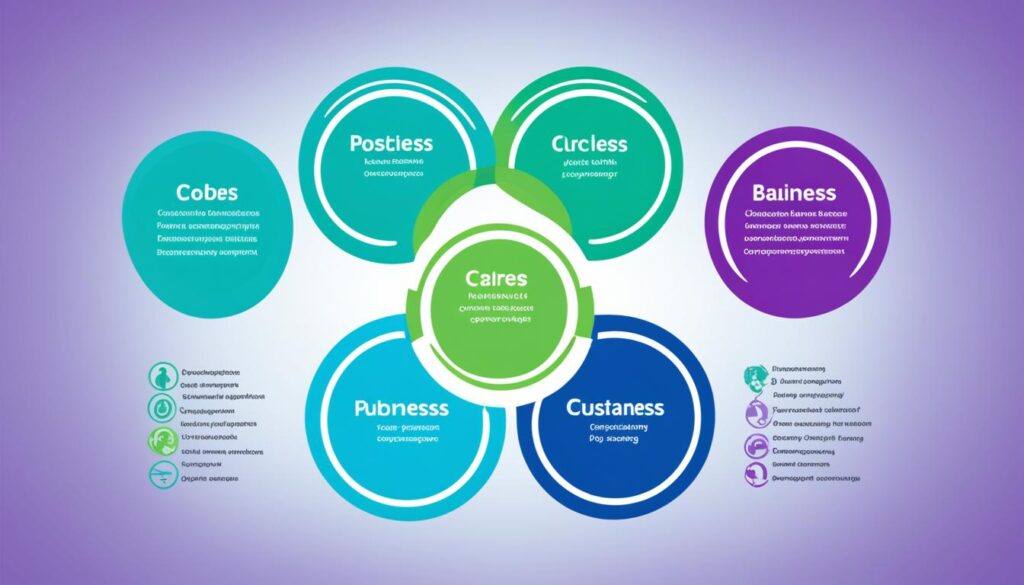
Now that we have explored the key features of these popular personality tests, it’s important to understand how they contribute to the overall job interview process. The next section will delve into the practical use and significance of personality tests in the hiring decision-making process.
The Caliper Profile Assessment for Job Interviews
The Caliper Profile Assessment is a valuable tool in the job interview process, providing valuable insights into a candidate’s personality traits and compatibility with job requirements. This assessment measures various personality traits that are directly related to key job skills, such as assertiveness and thoroughness.
By assessing traits like assertiveness and thoroughness, the Caliper Profile offers valuable insights into a candidate’s leadership ability, time management skills, and overall suitability for a particular job role.
The Caliper Profile Assessment presents candidates with a series of statements and asks them to choose the ones that best reflect their viewpoint. This helps assess their compatibility with the job requirements and provides employers with a clearer understanding of how well a candidate aligns with the desired traits and skills for the role.

| Trait | Description |
|---|---|
| Assertiveness | Measures the individual’s ability to confidently express their opinions and take charge in challenging situations. |
| Thoroughness | Evaluates the candidate’s attention to detail, organization, and ability to complete tasks with accuracy and precision. |
| Leadership Ability | Assesses the individual’s aptitude for leading and influencing others, as well as their ability to make sound decisions. |
| Time Management | Determines the candidate’s ability to prioritize tasks, manage their time effectively, and meet deadlines. |
The Gallup StrengthsFinder Assessment for Job Interviews
The Gallup StrengthsFinder assessment is a powerful tool in determining an individual’s top strengths and evaluating their suitability for specific job roles. This assessment focuses on identifying positive traits and enables employers to predict job performance more accurately. By understanding a candidate’s strengths, employers can make informed hiring decisions and ensure job interview success. 
Identifying Top Strengths
The Gallup StrengthsFinder assessment presents candidates with a series of statements and requires them to choose the one that best describes them. By analyzing the responses, the assessment identifies the individual’s top five strengths from a pool of 34 different possibilities. These strengths reflect the candidate’s unique personality and provide valuable insights into their potential for success in specific job roles.
Job Role Fit
Understanding a candidate’s top strengths helps employers determine if they align with the requirements of a particular job role. By matching a candidate’s strengths to the job responsibilities and demands, employers can assess their potential to excel in the position. The Gallup StrengthsFinder assessment enables employers to evaluate whether a candidate’s strengths are in line with the desired outcomes and competencies of the job.
Improved Predictability
The Gallup StrengthsFinder assessment has demonstrated its effectiveness in predicting job performance. By focusing on positive traits, the assessment provides employers with insights into a candidate’s potential for success in various job functions. The assessment’s ability to identify an individual’s strengths allows employers to gauge how well candidates may adapt to different tasks, challenges, and team dynamics.
Enhancing Interview Evaluation
Integrating the Gallup StrengthsFinder assessment into the job interview process enhances the evaluation of candidates. By combining traditional interview methods with this assessment, employers gain a broader perspective on a candidate’s fit within the organization. The strengths identified through the assessment can serve as valuable conversation starters during the interview, providing a deeper understanding of a candidate’s potential contributions and highlighting areas in which they may excel.
The Gallup StrengthsFinder Assessment Table
| Benefits of Gallup StrengthsFinder Assessment | Role Fit Evaluation | Predictability of Job Performance | Enhanced Interview Evaluation |
|---|---|---|---|
| Identifies an individual’s top five strengths | Assesses alignment with job requirements | Effectively predicts job performance | Provides insightful conversation starters during interviews |
| Offers insights into a candidate’s unique personality | Evaluates potential for success in specific job roles | Assists in evaluating adaptability and task compatibility | Provides a deeper understanding of a candidate’s potential contributions |
The Myers-Briggs Type Indicator for Job Interviews
The Myers-Briggs Type Indicator (MBTI) is a widely recognized personality assessment tool used in various settings, including job interviews. It evaluates individuals based on four dichotomies to determine their personality type. These dichotomies are extraversion (E) or introversion (I), sensing (S) or intuition (N), thinking (T) or feeling (F), and judging (J) or perceiving (P).
The MBTI assigns a unique four-letter type to individuals, such as INFJ or ESTP, based on their preferences. This assessment aims to provide insights into how individuals perceive and interact with the world around them, offering a framework for understanding their natural inclinations and tendencies.
However, it is important to note that while the MBTI can be insightful for personal growth and self-discovery, its utility in job selection and predicting job performance is not well-validated. The MBTI is more commonly used for personal development purposes, helping individuals gain a better understanding of themselves and their preferred communication and decision-making styles.
Understanding the MBTI Personality Types
Let’s take a closer look at the four dichotomies assessed by the MBTI:
Extraversion (E) or Introversion (I)
- Extraversion (E) individuals tend to be outgoing, energized by social interactions and external stimuli. They often enjoy working in teams and think out loud.
- Introversion (I) individuals, on the other hand, are more inwardly focused, gaining energy from solitude and reflective activities. They prefer to think before speaking and may appear more reserved in social situations.
Sensing (S) or Intuition (N)
- Sensing (S) individuals rely on their five senses to gather information and focus on what is real and tangible. They pay attention to details, prefer practical applications, and often prefer a step-by-step approach.
- Intuition (N) individuals are more future-oriented and imaginative. They focus on patterns, possibilities, and abstract concepts. They enjoy brainstorming and are comfortable with ambiguity.
Thinking (T) or Feeling (F)
- Thinking (T) individuals make decisions based on logic, objective facts, and cause-and-effect relationships. They value fairness and prioritize rationality and accuracy.
- Feeling (F) individuals, on the other hand, make decisions based on personal values and consider the impact on others. They prioritize harmony, empathy, and personal relationships in decision-making.
Judging (J) or Perceiving (P)
- Judging (J) individuals prefer structure, organization, and closure. They like planning, setting goals, and making decisions in advance. They tend to be focused and decisive.
- Perceiving (P) individuals are more flexible, spontaneous, and open-ended. They prefer to keep options open, adapt to changing circumstances, and explore possibilities. They may appear more casual and improvisational.
Understanding these preferences can shed light on individuals’ natural tendencies in various aspects of life, such as communication style, problem-solving approach, and decision-making methods.
While the MBTI offers valuable insights into individual preferences, employers should be cautious when using it as the sole basis for hiring decisions. Other validated and reliable assessments should be used to complement the evaluation process, ensuring a comprehensive and fair selection process.
The 16 Personality Factor Questionnaire for Job Interviews
The 16 Personality Factor Questionnaire, also known as the 16PF, is a comprehensive assessment that measures 16 key traits that individuals possess in varying degrees. Unlike other personality assessments that focus on overall personality traits, the 16PF is unique in its emphasis on how individuals might react to specific work situations.
This questionnaire consists of 170 carefully crafted questions designed to evaluate a candidate’s response and behavior in various job-related scenarios. By assessing how a candidate might handle tasks, stress, and other work-related challenges, the 16PF provides valuable insights into their potential for success in a particular role.
The 16PF is widely recognized as a valuable instrument for hiring and employee development. It helps employers gain a deeper understanding of a candidate’s behavioral tendencies, work style, and problem-solving capabilities. By considering the results of the 16PF during the interview process, companies can make more informed decisions about candidate fit and increase the likelihood of job interview success.
Key Features of the 16 Personality Factor Questionnaire
- Measures 16 key traits that individuals possess in varying degrees
- Focuses on evaluating how candidates might react to specific work situations
- Consists of 170 questions assessing task handling, stress management, and job-related behaviors
- Provides insights into a candidate’s potential for success in a particular role
- Considered a valuable instrument for hiring and employee development
By utilizing the 16PF in job interviews, employers can gain a deeper understanding of a candidate’s fit within their organization. This assessment helps identify individuals whose personality traits align with the requirements of the job and the company culture. Hiring managers can make more informed decisions based on the 16PF results, contributing to improved hiring outcomes and ultimately increasing job interview success rates.
With the insights provided by the 16 Personality Factor Questionnaire, employers can form a more comprehensive picture of each candidate’s potential, improving the accuracy of their hiring decisions. By incorporating the 16PF into the job interview process, companies can enhance their ability to select the right individuals who will thrive in their organization.
The Use of Personality Tests in Job Interview Process
Employers utilize personality tests in job interviews to assess if candidates are a good fit for their company culture, role, and team. These tests play a vital role in determining whether candidates’ personalities align with the overall work environment, job duties, and communication style requirements. By providing insights into a candidate’s work values, preferences, and potential for success in a specific role, personality tests enable employers to make more informed hiring decisions.
Personality tests can be a valuable tool in reducing discrimination based on factors like gender or ethnicity. By focusing on objective measurements of a candidate’s traits and capabilities, these tests shift the emphasis from subjective biases to the alignment between the candidate’s personality and the company’s requirements. This helps ensure a fair and equitable evaluation process for all applicants.
Understanding a candidate’s communication style is crucial for building effective teams and achieving organizational success. Personality tests provide employers with insights into how candidates prefer to communicate, collaborate, and solve problems. This information can then be used to assess the compatibility between the candidate’s communication style and the existing team dynamics.
Assessing Cultural Fit
Company culture plays an integral role in driving employee engagement, productivity, and job satisfaction. By incorporating personality tests into the job interview process, employers are able to assess if candidates’ personalities align with the company’s values, mission, and working environment. A good cultural fit ensures that candidates will thrive in the organization, contribute positively to the team, and help foster a positive work environment.
Enhancing Team Dynamics
Personality tests provide valuable insights into a candidate’s interpersonal skills, teamwork abilities, and collaboration preferences. By understanding these aspects, employers can build teams that are well-balanced, diverse, and capable of working together harmoniously. Ensuring a good fit between candidates’ personalities and the existing team dynamics promotes collaboration, reduces conflicts, and enhances overall team performance.
Optimizing Roles and Responsibilities
Personality tests can help employers identify candidates whose personality traits are well-suited for specific roles and responsibilities within the organization. By matching candidates’ attributes to the requirements of the job, employers can optimize job performance and increase the likelihood of success. This alignment between personality and role is crucial for not only individual success but also overall organizational effectiveness.
Personality tests enable us to make more informed hiring decisions by assessing candidates’ compatibility with our company culture, communication style, and role requirements. They provide valuable insights into work values, preferences, and potential for success. Through these tests, we strive to build teams that are cohesive, productive, and capable of driving our organization forward.
What to Expect from Personality Tests in Job Interviews
Personality tests in job interviews play a crucial role in assessing candidates’ suitability for a position. These tests provide valuable insights into their personalities, traits, and communication styles, enabling employers to make informed hiring decisions. It’s important for candidates to understand what to expect from these tests and how to approach them effectively.
- Part of the Candidate Assessment Process: Personality tests are an integral part of the overall candidate assessment process, which also includes interviews, skills testing, and reference checks. These tests offer a deeper understanding of candidates beyond what can be gleaned from traditional interviews alone.
- A Tool for Providing Additional Information: Candidates should not view personality tests as pass or fail situations. Instead, they should see them as tools that provide additional information to employers. These tests offer unique insights into candidates’ behavioral tendencies, work styles, and compatibility with the job requirements.
- Honesty is Key: It is crucial for candidates to answer the questions in personality tests honestly. Trying to provide the “right” answers or manipulate the results may lead to inaccurate assessments and compromise the hiring process. Employers value authenticity and want to understand candidates as they truly are.
“Personality tests offer employers a deeper understanding of candidates beyond what can be gleaned from traditional interviews alone.”
Personality tests in job interviews provide a comprehensive assessment of candidates and help employers evaluate their suitability for specific roles. By understanding what to expect from these tests and approaching them with honesty, candidates can enhance their chances of success in the job interview process.
| Benefits of Personality Tests in Job Interviews | Considerations for Candidates |
|---|---|
| 1. Provide insights into candidates’ personalities and traits | 1. View personality tests as tools for providing additional information |
| 2. Assess compatibility with job requirements and communication styles | 2. Answer questions honestly and avoid trying to manipulate results |
| 3. Enhance the overall candidate assessment process | 3. Understand that honesty is valued by employers |
How to Approach Personality Tests in Job Interviews
If asked to take a personality test in a job interview, we should approach it with an open mind and understanding of its purpose. Personality tests play a crucial role in helping employers assess compatibility with company culture, job requirements, and communication styles. It’s essential to answer the questions honestly and not try to manipulate the results. Researching the specific assessment being used and familiarizing ourselves with the format and types of questions beforehand can also be beneficial.
Personality tests provide valuable insights into our behavioral traits and offer employers a deeper understanding of how we might fit within the organization. The results help determine if our personality aligns with the job role, team dynamics, and overall work environment. By answering truthfully, we allow employers to make an accurate assessment of our suitability for the position.
Manipulating the test results can lead to a misalignment between our actual personality and the job requirements. This, in turn, may result in dissatisfaction, poor performance, and eventual termination if we are unable to meet the demands of the role. It’s in our best interest to be authentic during the assessment process and present ourselves as genuinely as possible.
Familiarizing ourselves with the specific assessment we will be taking can help ease any potential stress or anxiety. Researching the format and types of questions commonly used in the assessment can provide us with a sense of what to expect, allowing us to feel more prepared and confident during the interview. Additionally, understanding the purpose of the test helps us approach it with the right mindset, making it easier to navigate and respond genuinely to the questions.

The Role of Personality Tests in Hiring Decision Making
Personality tests play a crucial role in the hiring process by providing valuable insights into a candidate’s personality traits and their compatibility with the job requirements. However, it’s important to note that personality tests should not be the sole determinant in hiring decisions, but rather one part of a comprehensive evaluation process.
When used alongside interviews, references, and other tools, personality tests can help employers make more informed hiring decisions. These tests provide a deeper understanding of a candidate’s behavioral tendencies, work style, and interpersonal skills.
By evaluating a candidate’s personality traits, employers can assess whether they align with the company culture and the specific requirements of the job. This information helps in identifying individuals who are more likely to thrive in the role and contribute positively to the organization.
While personality tests are an essential tool in the hiring process, they should be used in conjunction with other evaluation methods to ensure a comprehensive assessment. By considering multiple factors, employers can make holistic decisions that take into account the candidate’s qualifications, experience, and potential for success.
Benefits of Incorporating Personality Tests
“Personality tests provide valuable insights into a candidate’s behavioral tendencies, work style, and interpersonal skills.”
1. Enhanced Candidate Evaluation: Personality tests offer a unique perspective on a candidate’s suitability for a specific role and help employers gain a deeper understanding of their potential for success within the organization.
2. Alignment with Company Culture: By assessing a candidate’s personality traits, employers can determine whether they align with the company’s values, culture, and vision. This alignment contributes to a harmonious work environment and decreases the likelihood of potential conflicts.
3. Improved Job Fit: Personality tests help match candidates’ traits with the requirements of the job, ensuring that the individual possesses the necessary characteristics to excel in the role. This ultimately leads to higher job satisfaction and increased productivity.
4. Effective Team Building: Personality tests aid in forming well-balanced teams by identifying candidates with complementary traits. This diversity of personalities promotes collaboration, creativity, and innovation within the team.
By incorporating personality tests into the hiring decision-making process, employers can make more informed choices, increase the likelihood of hiring the right candidate, and build a strong and cohesive workforce.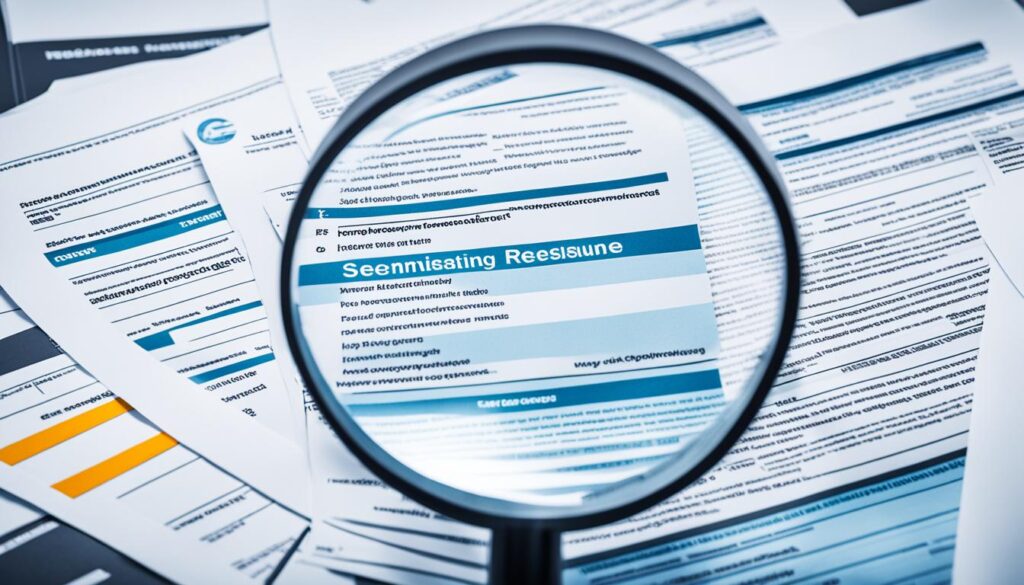
| Personality Test | Key Features | Validation |
|---|---|---|
| Caliper Profile | Measures key job skills, provides insights into assertiveness, thoroughness, and leadership ability | Validated for job selection |
| Gallup StrengthsFinder | Identifies top five strengths that align with job requirements | Validated for job performance prediction |
| Myers-Briggs Type Indicator | Assesses personality type based on preferences for extraversion or introversion, sensing or intuition, thinking or feeling, and judging or perceiving | Not validated for job selection |
| 16 Personality Factor Questionnaire | Measures 16 traits related to work situations and job performance | Considered valuable for hiring and employee development |
Conclusion
Personality tests play a crucial role in the job interview process, allowing employers to assess the suitability of candidates for company culture, job roles, and communication styles. By utilizing validated assessments like the Caliper Profile, Gallup StrengthsFinder, and 16 Personality Factor Questionnaire, employers can effectively identify ideal candidates. However, it is essential for employers to consider personality tests as part of a holistic evaluation process that includes interviews, references, and skills testing.
The insights gained from personality tests enable employers to make more informed hiring decisions, selecting individuals who not only possess the necessary skills but also align with the values and expectations of the organization. These assessments provide valuable information about a candidate’s personality traits, helping employers understand their potential for success in a specific role.
To ensure the accuracy and reliability of personality tests, employers should use validated assessments designed specifically for selection purposes. By integrating personality tests into the overall evaluation process, employers can enhance their ability to identify candidates who are the right fit for the job and the company, ultimately increasing the chances of job interview success.
How Can I Use Personality Test Insights for Job Interviews?
Discover personality test insights and tailor your responses in job interviews to highlight your strengths. Use your knowledge of your personality traits to give specific examples of how you have successfully handled challenges in the past. This will demonstrate self-awareness and show the interviewer how you can add value to the company.
FAQ
What is the purpose of personality tests in job interviews?
Personality tests in job interviews are used to assess if candidates are a good fit for the company culture, role, and team. They provide insights into candidates’ personalities, traits, and communication styles, helping employers make more informed hiring decisions.
What are some popular personality tests used in job interviews?
Some popular personality tests used in job interviews are the Caliper Profile, Gallup StrengthsFinder, Myers-Briggs Type Indicator, and the 16 Personality Factor Questionnaire.
How does the Caliper Profile Assessment work?
The Caliper Profile Assessment measures personality traits related to key job skills. It assesses traits such as assertiveness and thoroughness and provides insights into a person’s leadership ability and time management.
What does the Gallup StrengthsFinder Assessment focus on?
The Gallup StrengthsFinder Assessment focuses on positive traits and identifies an individual’s top five strengths out of 34 possibilities. It helps determine if a candidate is a good fit for specific job roles.
How does the Myers-Briggs Type Indicator assess personality?
The Myers-Briggs Type Indicator assesses four dichotomies to determine an individual’s personality type. It assigns a four-letter type based on preferences for extraversion or introversion, sensing or intuition, thinking or feeling, and judging or perceiving.
What does the 16 Personality Factor Questionnaire measure?
The 16 Personality Factor Questionnaire focuses on how individuals might react to specific work situations rather than overall personality traits. It measures 16 traits that individuals possess in varying degrees.
How do personality tests help in the job interview process?
Personality tests help employers assess candidate compatibility with company culture, job roles, and communication styles. They provide insights into candidates’ work values, preferences, and potential for success in a specific role.
How should candidates approach personality tests in job interviews?
Candidates should approach personality tests with an open mind and answer the questions honestly. They should not try to manipulate the results and should research the specific assessment being used to familiarize themselves with the format and types of questions.
Are personality tests the sole determinant in hiring decisions?
Personality tests should not be the sole determinant in hiring decisions but rather one part of a comprehensive evaluation process. When used alongside other assessment tools, they can help employers make more informed hiring decisions.
What is the role of personality tests in the hiring decision-making process?
Personality tests play an important role in the hiring decision-making process by providing valuable insights into candidates’ personality traits and compatibility with job requirements. They are used alongside interviews, references, and other assessment tools.
Felicity, our Author, pens in-depth articles and guides that delve into the heart of personal discovery. Her narrative-driven approach weaves together theory, practice, and personal anecdotes, making the journey of self-exploration both relatable and inspiring. Felicity’s contributions help illuminate the path for those seeking a deeper understanding of themselves and their relationships.
Personality Exploration
Unlock Your MBTI Functions with Our Personality Test

Did you realize that understanding your personality type can unlock the key to personal growth and self-awareness? Whether you’re interested in learning about your strengths, weaknesses, or communication style, our personality test is created to assist you in delving deep into the complexities of your unique MBTI (Myers-Briggs Type Indicator) functions. By revealing the hidden aspects of your personality, you can acquire valuable insights about yourself and begin a transformative path of self-discovery. Take our test today and unlock your true potential!
Key Takeaways:
- Our personality test unlocks your MBTI functions and provides insights into your strengths, weaknesses, and unique traits.
- Understanding your personality type can lead to greater self-awareness and personal growth.
- By exploring the nuances of your personality, you can make conscious choices that align with your values and aspirations.
- The insights from our test can enhance your relationships, communication style, and compatibility with others.
- Applying your personality insights in various aspects of life, such as your career choices, can lead to increased satisfaction and success.
Explore the Power of MBTI Functions
The MBTI functions, based on the personality theory developed by Isabel Myers and Katharine Briggs, provide a framework for understanding and categorizing different aspects of personality type. Our personality test employs this framework to measure preferences for the four dimensions of personality type and 23 detailed facets of type. By unlocking your MBTI functions, you can gain insights into your strengths, weaknesses, communication style, and relationship needs.
Understanding the power of MBTI functions is essential for self-discovery and personal growth. Each function represents a unique aspect of your personality, contributing to your overall behavior and preferences. By identifying and embracing these functions, you can gain a deeper understanding of yourself and enhance your interactions with others.
Our personality test is specifically designed to help individuals uncover their MBTI functions and improve their self-awareness. It provides a comprehensive assessment of your personality type, allowing you to explore the intricacies of your own unique traits. Through this exploration, you can gain valuable insights into your strengths and weaknesses, enabling personal growth and development.
When you take our personality test, you will answer a series of questions that assess your preferences in various situations. These responses will provide us with the necessary information to determine your MBTI functions and analyze your personality type. The test is structured to measure your preferences in four key dimensions:
- Extraversion (E) or Introversion (I)
- Sensing (S) or Intuition (N)
- Thinking (T) or Feeling (F)
- Judging (J) or Perceiving (P)
Based on your responses, our test will reveal your dominant and auxiliary functions, shedding light on how you perceive and interact with the world around you.
Once you have discovered your MBTI functions, you can gain a better understanding of your communication style and relationship needs. For example, individuals with Extraverted Thinking (Te) as their dominant function tend to prefer logical, solution-oriented communication, while those with Introverted Intuition (Ni) may lean towards abstract, conceptual discussions. By recognizing these preferences, you can adapt your communication style to effectively connect with others.
This deep understanding of your MBTI functions also allows you to identify potential areas for personal growth. By recognizing your weaknesses and acknowledging areas where you may need improvement, you can take proactive steps to enhance those aspects of your personality. Additionally, understanding your strengths can empower you to leverage and maximize your natural talents, fueling personal and professional success.
Our personality test is a valuable tool in unlocking the power of MBTI functions and gaining a comprehensive understanding of your personality type. It offers insights that can guide you in various aspects of life, including career choices, relationship dynamics, and personal growth. By embracing the knowledge provided by our test, you can embark on a journey of self-discovery, self-improvement, and self-fulfillment.
The Science Behind the Personality Test
Our personality test is built on a foundation of extensive research and has been enhanced through valuable user feedback. We have dedicated ourselves to ensuring the utmost accuracy and reliability of our test by drawing inspiration from prominent personality frameworks. The combination of these frameworks has given rise to a comprehensive and nuanced assessment of personality traits across multiple dimensions.
One such influential framework is the Big Five (OCEAN) model, which identifies five broad dimensions of personality: Openness, Conscientiousness, Extraversion, Agreeableness, and Neuroticism. By incorporating this model into our test, we capture essential aspects of personality that contribute to a richer understanding of oneself.
Another influential foundation is the Jungian psychology that underpins the Myers-Briggs Type Indicator (MBTI) personality test. By leveraging the insights of this theoretical framework, our test provides a deeper examination of personality type preferences, shedding light on the unique ways individuals perceive and interact with the world.
“Our personality test incorporates the Big Five (OCEAN) model and the Jungian psychology underlying the MBTI, producing a robust methodology for self-discovery.”
While it is crucial to emphasize that no test can determine personality type with absolute certainty, our test strives to be a reliable tool for self-discovery. It presents a methodological approach that considers a comprehensive range of traits and dimensions to provide users with valuable insights into their unique personalities.
Through extensive research, refinement, and meticulous analysis, we have crafted a personality test that aims to uncover the depth and intricacies of your individuality. Take our test and embark on a journey of self-discovery today!
The Science Behind the Personality Test
| Framework | Description |
|---|---|
| Big Five (OCEAN) Model | A renowned personality framework that categorizes personality traits into five broad dimensions: Openness, Conscientiousness, Extraversion, Agreeableness, and Neuroticism. |
| Jungian Psychology | The theoretical foundation of the MBTI test, exploring personality type preferences and how individuals perceive and interact with the world. |

Taking the Personality Test
Taking our personality test is quick and easy. The test consists of 130 questions and typically takes around 10-15 minutes to complete. It is important to approach each question with thoughtfulness and honesty to ensure accurate results. The test can be completed in one sitting, and your responses will be saved if you create an account.
After completing the test, you will receive a brief report summarizing your results and the option to unlock a more comprehensive full report for further insights.
Duration Process 10-15 minutes Answer 130 questions thoughtfully and honestly Create an account to save your responses Receive a brief report summarizing your results Optional: Unlock a more comprehensive full report
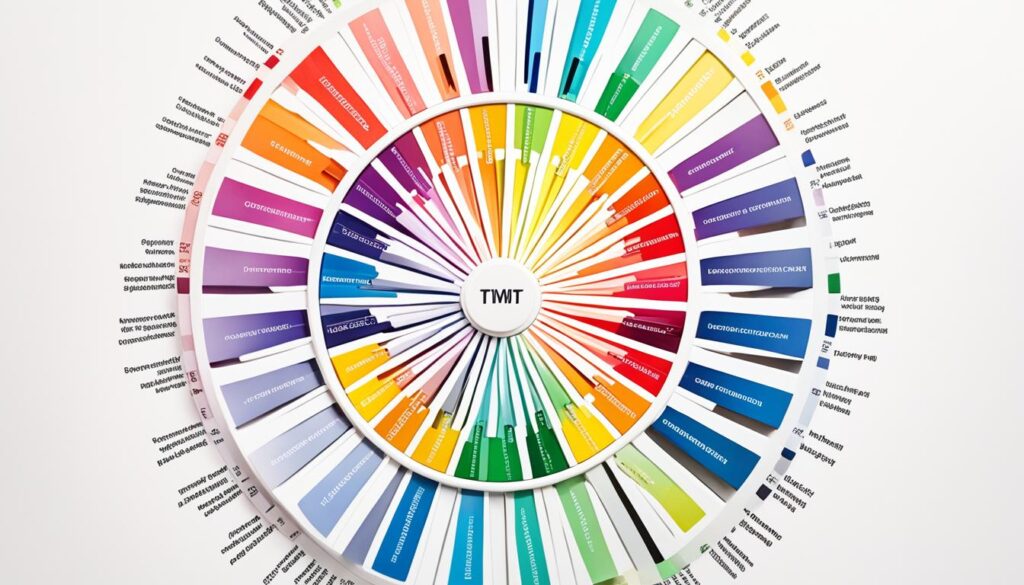
Understanding Your Results
Your personality test results offer valuable insights into your unique personality type. By examining the report, you will gain a deeper understanding of your strengths, weaknesses, communication style, and relationship needs. These findings are instrumental in interpreting your personality and making more informed decisions across various aspects of your life. Moreover, they enable you to forge deeper connections with individuals who share your values and perspective.
Let’s take a closer look at what your personality test results offer:
- Strengths: The report will highlight your key strengths, showcasing the areas where you excel and thrive.
- Weaknesses: It will also draw attention to your potential areas for improvement, helping you identify areas of personal growth.
- Communication Style: Understanding your communication style will enhance your interpersonal interactions, enabling effective and meaningful connections with others.
- Relationship Needs: The report will shed light on your relationship needs and preferences, supporting you in forming and nurturing fulfilling connections with others.
By analyzing and interpreting your personality test results, you can unlock valuable knowledge about yourself and leverage this understanding to make choices aligned with your true nature and aspirations. It serves as a roadmap for personal growth, guiding you to unleash your full potential and live a more fulfilling life.
“Your results provide a window into the depths of your personality, empowering you to embrace your unique qualities and navigate life’s intricacies with self-assuredness.”
Personality Test Results Overview:
| Aspect | Findings |
|---|---|
| Strengths | Highlights your core strengths and areas of expertise. |
| Weaknesses | Shines a light on opportunities for personal growth and improvement. |
| Communication Style | Provides insights into how you interact and connect with others. |
| Relationship Needs | Guides you in forming positive and fulfilling relationships. |
Understanding and analyzing your personality test results is a transformative step towards self-awareness and personal development. It enables you to align your choices and pursue opportunities that resonate with your unique qualities, fostering a sense of fulfillment and authenticity.

The Impact of Personality Type on Relationships
Your personality type can have a profound impact on your relationships. Understanding your own personality type, as well as that of others, allows you to navigate the complexities of interpersonal dynamics more effectively. Our personality test not only helps you gain a better understanding of yourself, but also provides insights into your compatibility with others.
By taking our personality test, you can uncover essential information about your personality type, such as your communication style, needs in relationships, and potential areas of compatibility with others. Armed with this knowledge, you can forge stronger connections with individuals who share your values, interests, and worldview.
“Understanding your personality type is like having a roadmap for navigating the world of relationships. It helps you understand your own needs and preferences, as well as those of your partner. This self-awareness is crucial in building healthy and fulfilling relationships.”
For instance, if you identify as an introvert, you may find that you are more compatible with someone who also values quiet time and introspection. On the other hand, extroverts might thrive in relationships with individuals who enjoy socializing and adventure.
Through the Boo platform, you can connect with like-minded individuals who share your passions and perspectives. This fosters meaningful connections and increases the likelihood of finding compatible friends and partners.
Understanding your personality type empowers you to make informed decisions when it comes to building and maintaining relationships. By leveraging the insights gained from our personality test, you can proactively nurture successful and fulfilling connections with others.
Personality Type and Relationship Compatibility
To further illustrate the impact of personality type on relationships, let’s consider a hypothetical scenario:
| Personality Type | Strengths in Relationships | Weaknesses in Relationships |
|---|---|---|
| Introvert | Deep listening skills, loyalty, thoughtful gestures | Tendency to withdraw during conflict, difficulty initiating social activities |
| Extrovert | Enthusiastic, outgoing, energized by social interaction | May dominate conversations, struggle with introverted partners’ need for solitude |
| Thinker | Logical problem-solving, objective perspective | May struggle with emotional support, appear detached in difficult situations |
| Feeler | Empathy, warmth, emotional support | May prioritize emotions over rationality, struggle with tough decision-making |
| Judger | Organized, reliable, punctual | Can be perceived as controlling, struggle with partners’ spontaneity |
| Perceiver | Flexible, adaptable, open-minded | May struggle with commitment, difficulty with planning and structure |
This table demonstrates how different personality types bring distinct strengths and weaknesses to relationships. By understanding and appreciating these differences, you can navigate potential challenges with empathy and compassion, strengthening your bond with your partner.
By recognizing the impact of personality type on relationships and using our personality test to gain insights and connect with like-minded individuals, you can cultivate more meaningful and compatible relationships. Take the first step towards building stronger connections today!

Personal Growth and Self-Reflection
Our personality test serves as a catalyst for personal growth and self-reflection. By gaining a deeper understanding of your personality type and the intricacies of your traits, you can embark on a journey of self-improvement and development.
The insights provided by the test can help you identify areas for growth, overcome challenges, and embrace your strengths. Through self-reflection, you can analyze your thoughts, emotions, and behaviors, gaining valuable insights into your patterns and tendencies.
This self-awareness allows you to make conscious choices that align with your values and personal goals. By leveraging the power of self-reflection, you can enhance your overall well-being and lead a more fulfilling life.
“Personal growth is not a destination, but a continuous journey of self-discovery and improvement.”
By constantly evaluating your beliefs, values, and aspirations, you can align your actions with your authentic self. Recognizing areas of improvement and setting realistic goals can help you progress on your personal growth journey.
The Benefits of Personal Growth and Self-Reflection
There are numerous benefits to personal growth and self-reflection:
- Increased self-awareness: Understanding yourself better allows you to make choices that align with your values and aspirations. It also helps you recognize and manage your emotions effectively.
- Improved relationships: When you have a deep understanding of yourself, you can foster healthier and more meaningful connections with others. You can communicate your needs, empathize with others, and navigate conflicts more effectively.
- Enhanced resilience: Self-reflection equips you with the ability to bounce back from setbacks and face challenges with a positive mindset. It helps you develop resilience, adaptability, and the ability to learn and grow from difficult experiences.
- Clarity and focus: Personal growth and self-reflection provide clarity about your values, passions, and life purpose. This clarity allows you to prioritize your goals and make decisions that are in line with your long-term vision.

| Benefits of Personal Growth and Self-Reflection |
|---|
| Increased self-awareness |
| Improved relationships |
| Enhanced resilience |
| Clarity and focus |
Personal growth and self-reflection go hand in hand. By using the insights gained from our personality test, you can embark on a transformative journey of self-discovery, empowering yourself to reach your full potential.
Applying Personality Insights in Various Aspects of Life
The insights gained from our personality test can be applied in various areas of life. Understanding your unique qualities can help you make informed decisions about your career path, identifying roles and environments that align with your personality type.
By utilizing the knowledge gained from the test, you can navigate both personal and professional aspects of life more effectively. Here are some practical applications of the personality test:
1. Career Development
“Knowing your personality type can provide invaluable guidance when it comes to choosing a career. By understanding your strengths, preferences, and work style, you can identify job roles and industries that are well-suited to your personality. This insight can help you find job satisfaction and excel in your chosen field.”
Whether you’re just starting your career or considering a change, our personality test can offer valuable insights to guide your decision-making process.
2. Interpersonal Relationships
“Understanding your communication style and compatibility with others is crucial for building and maintaining healthy relationships. With our personality test, you can gain insights into your unique approach to conflict resolution, collaboration, and interpersonal dynamics. This knowledge can help you navigate relationships more effectively and foster meaningful connections.”
By understanding your own personality type and that of others, you can enhance your interpersonal skills and build stronger relationships, both personally and professionally.
3. Personal Growth and Development
“Self-awareness is the key to personal growth. Our personality test provides deep insights into your strengths, weaknesses, and areas for improvement. Armed with this knowledge, you can focus on developing your strengths and overcoming challenges, leading to personal growth and self-improvement.”
By utilizing the insights gained from the test, you can embark on a journey of self-reflection and continuous improvement, enhancing various aspects of your life.

Conclusion
Our personality test offers a valuable tool for unlocking your MBTI functions and gaining a deeper understanding of yourself. By exploring your unique qualities, strengths, and weaknesses through the test, you can embark on a journey of self-discovery and personal growth.
The insights provided by our personality test can guide you in various aspects of life, whether it’s making informed career choices that align with your personality type or building meaningful relationships based on compatibility. Understanding your own personality and traits is the first step to enhancing self-awareness and making conscious choices.
Embrace your true self and enhance your self-awareness with our personality test today. Discover the key to unlocking your potential and developing a greater understanding of who you are. Start your journey towards personal growth and fulfillment now.
The personality test is designed to help individuals unlock their MBTI functions and gain a deeper understanding of themselves. It aims to enhance personal growth and self-awareness by exploring the nuances of personality and delving into the complexity of individuality.
MBTI functions are based on the personality theory developed by Isabel Myers and Katharine Briggs. They provide a framework for understanding and categorizing different aspects of personality type. Our personality test measures preferences for the four dimensions of personality type and 23 detailed facets of type, unlocking insights into strengths, weaknesses, communication style, and relationship needs. The personality test is based on extensive research and has been refined through user feedback to ensure accuracy and reliability. It draws inspiration from influential personality frameworks, including the Big Five (OCEAN) model and the Jungian psychology underlying the MBTI personality test. While no test can determine personality type with 100% accuracy, our test is designed to be a reliable tool for self-discovery.
The personality test consists of 130 questions and typically takes around 10-15 minutes to complete. It is important to approach each question with thoughtfulness and honesty to ensure accurate results. The test can be completed in one sitting, and your responses will be saved if you create an account.
After completing the test, you will receive a brief report summarizing your results. You also have the option to unlock a more comprehensive full report for further insights. The report will highlight key points such as your strengths, weaknesses, communication style, and relationship needs. It will offer recommendations for personal growth based on your unique qualities.
Understanding your own personality type and that of others can help navigate interpersonal dynamics more effectively. The personality test not only helps you understand yourself better but also offers insights into compatibility with others. Through the Boo platform, you can connect with like-minded individuals who share your values, interests, and worldview, fostering meaningful connections and potentially finding compatible friends and partners.
The personality test serves as a catalyst for personal growth and self-reflection. By gaining a deeper understanding of your personality type and traits, you can embark on a journey of self-improvement. The test’s insights can help identify areas for growth, overcome challenges, and embrace strengths. By using this self-knowledge to make conscious choices, you can enhance your overall well-being and lead a more fulfilling life. Understanding your unique qualities can help make informed decisions about your career path and identify roles and environments that align with your personality type. The test can also enhance interpersonal relationships by providing insights into communication styles, conflict resolution approaches, and compatibility with others. By utilizing the knowledge gained from the test, you can navigate personal and professional life more effectively.
FAQ
What is the purpose of the personality test?
What are MBTI functions?
How accurate is the personality test?
How long does it take to complete the personality test?
What will I get after taking the personality test?
How can the personality test impact relationships?
How can the personality test contribute to personal growth?
How can personality insights be applied in different aspects of life?
Eugene brings a fresh, dynamic voice to our platform as one of our talented Writers. Specializing in research-driven content, he explores the latest findings in psychology and personal growth, translating them into actionable insights for our readers. Eugene’s work is fueled by a curiosity about what makes us tick and a desire to help others unlock their potential.
-

 Self-Understanding4 days ago
Self-Understanding4 days agoUnderstanding DMCA Protections & Compliance
-

 Enneagram of Personality2 months ago
Enneagram of Personality2 months agoEnneagram Test: Printable Version for Easy Self-Discovery
-

 Personality Exploration2 months ago
Personality Exploration2 months agoDiscover Your Traits with Atomic Habits Personality Test
-

 Personality Exploration3 days ago
Personality Exploration3 days agoDOPE Personality Test Explained: Traits & Types
-
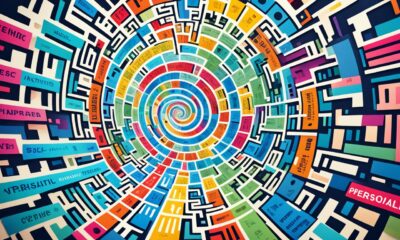
 Personality Exploration1 month ago
Personality Exploration1 month agoUnderstanding Personality Tests | Our Guide Explained
-

 Relationship Dynamics1 month ago
Relationship Dynamics1 month agoCan a Man Truly Love His Side Chick
-
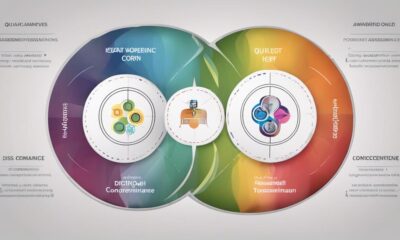
 DISC Assessment2 months ago
DISC Assessment2 months agoUnderstanding Your DISC Assessment Results: Meaning and Interpretation
-

 Personality Exploration2 hours ago
Personality Exploration2 hours agoAlpha Beta Omega Sigma Female Personality Quiz
